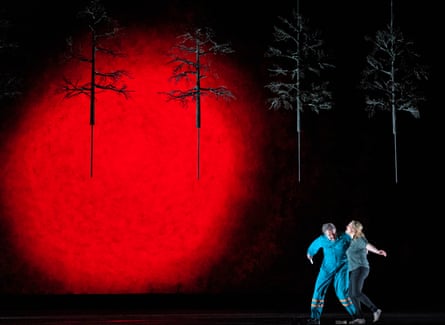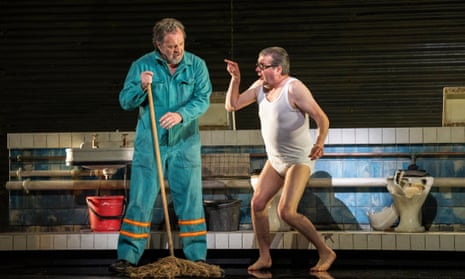Unsuccessful productions of Berg’s first opera are rare. Wozzeck is one of those works – Britten’s The Turn of the Screw is another – that seem hard to get wrong on stage, that are dramatically so tightly plotted and intensely wrought musically that the drama plays out unfalteringly, without the need for too much directorial intervention. Georg Büchner’s fragmentary 1836 play, from which Berg took his libretto, may be set in the late 18th century, but the pathetic plight of its central character, driven to madness and murder by poverty, exploitation and sexual jealousy, is timeless and universal.
Perhaps that robustness explains the rather neutral quality of Deborah Warner’s new production for the Royal Opera, which often seems to go out of its way to avoid being too specific. The designs by Hyemi Shin veer between a detailed naturalism, which fixes the production somewhere in the second half of the 20th century, and the minimally abstract. The opening scene is set in a toilet block complete with a row of lavatories (conjuring memories of ENO’s infamous A Masked Ball!) and a constant traffic of pissing squaddies, where Wozzeck (Christian Gerhaher) is working as a cleaner, while his final humiliation at the hands of the strutting Drum Major (Clay Hilley) and his cronies takes place in a barrack room festooned with clothes lines. Yet other scenes – Marie’s bible reading, her murder and Wozzeck’s subsequent drowning are all acted out on a virtually empty stage, relieved only by some gorgeously coloured backcloths.

Christian Gerhaher (Wozzeck) and Anja Kampe (Marie) in Wozzeck by Alban Berg at Royal Opera House. Photograph: Tristram Kenton/The Guardian
Sung with all the care for the text you would expect from such an outstanding Lieder singer, Gerhaher’s Wozzeck is a victim from the very start. His treatment at the hands of the Captain and the Doctor (Peter Hoare and Brindley Sherratt, both superb) is less caricatured than it often is; both may be mad in their own ways, too, but they are not too demonstrative about it. But as he shuffles from one disaster to the next, Wozzeck seems to shrink slowly into himself, his relationship with the outside world, tenuous enough from the start, gets more and more remote, so that only Anja Kampe’s expressive Marie seems fully human, her exchanges with her child (the wonderfully self-possessed Jonah Elijah McGovern) immensely touching and offering the opera’s only moments of real warmth.
If this production presents Wozzeck as an opera of nuance rather than as the out-and-out expressionist shocker as it’s sometimes characterised, then Antonio Pappano’s conducting reinforces that view. The score is wonderfully played by the Opera House orchestra, with a neoclassical clarity to some of the textures, and the big emotional punch reserved for the Mahlerian D minor interlude before the final scene; perhaps a bit more edge would have been welcome at times, but music and drama certainly dovetail perfectly as it is.

Comments (…)
Sign in or create your Guardian account to join the discussion